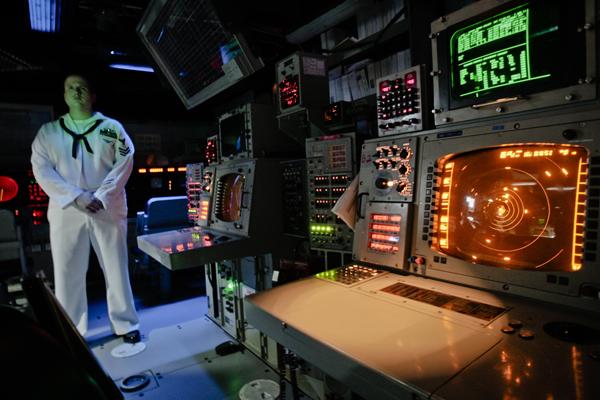You are here
US, Russia step up war of words over missile shield
By AFP - May 14,2016 - Last updated at May 14,2016

In this June 7, 2011 file photo, a US navy officer, name not available, stands on the weapons control deck of the USS Monterey, in the Black Sea port of Constanta, Romania (AP photo)
REDZIKOWO, Poland — The United States and Russia on Friday accused each other of mounting an aggressive military presence in northern Europe, with Moscow vowing to "end threats" posed by a US missile shield near its border.
The stepped-up war of words came as Poland on Friday broke ground on the northern section of a US missile defence shield launched in Romania a day earlier, which Russia slammed as a serious security threat despite US assurances to the contrary.
Russian President Vladimir Putin on Friday warned Washington that Moscow will consider measures to "end threats" from the US anti-missile systems in Europe but said it would not be engaged in a new arms race.
"Now that these anti-missile elements have been installed, we will be forced to consider putting an end to the threats emerging in relation to Russia's security," Putin told defence officials in televised remarks.
US President Barack Obama hit back hours later, warning Russia about its military build-up in northern Europe, as he hosted leaders from five Nordic countries at the White House.
"We are united in our concern about Russia's growing aggressive military presence and posture in the Baltic-Nordic region," Obama said.
Russian Defence Minister Sergei Shoigu said last week that Moscow will set up three new divisions in the west and south of the country by the end of the year to counter NATO forces close to its border.
Relations between NATO and Moscow have sharply deteriorated since Russia annexed Crimea from Ukraine in March 2014, sparking fears among other eastern European countries that they too could be targets of Russian aggression.
NATO European shield
Located in Redzikowo, northern Poland, and Deveselu in southern Romania, the two US missile interceptor stations are part of NATO's larger European shield, due to become fully operational by 2018.
US and NATO officials insist the system is intended to counter the threat of short- and medium-range ballistic missiles, particularly from so-called "rogue" states in the Middle East.
But with the Redzikowo station just 250 kilometres from the Russian enclave of Kaliningrad, Moscow views the system as a security threat on its very doorstep.
US Deputy Secretary of Defence Robert Work was on hand Friday for the start of construction on the Aegis Ashore-type missile defence facility in Redzikowo.
It will include 24 land-based SM-3 missiles, as well as anti-aircraft systems.
The facility in Poland "is a US contribution to NATO missile defence", Work said at the ground-breaking ceremonies, adding that "when completed in 2018 it will be capable of defending the central and northern arc of NATO".
Work also said that "by the [NATO] Warsaw summit in July, we expect alliance leaders to declare initial operational capability for the NATO ballistic missile defence system."
"Although we joined NATO years ago, now we are seeing that NATO is truly entering Poland," Polish President Andrzej Duda said before ceremony participants took shovels in hand and began digging at the Polish air force base.
Launched in 2010, NATO's anti-missile shield system — based essentially on US technology — involves the progressive deployment of missile interceptors and powerful radar in eastern Europe and Turkey.
NATO and the United States said this spring that they will switch their defence doctrine from assurance to deterrence in eastern Europe in response to a "resurgent and aggressive Russia" following its annexation of Crimea.
The Pentagon said in March it would begin continuous rotations of an additional armoured brigade of about 4,200 troops in eastern Europe beginning in early 2017.
Spooked by Russian action towards Ukraine, eastern NATO members including the formerly Soviet-ruled Baltic states and Poland have lobbied the alliance to increase its presence in the region to guarantee security.
Related Articles
DEVESELU, Romania — The United States switched on an $800 million missile shield in Romania on Thursday that it sees as vital to defend itse
Russian President Vladimir Putin said on Thursday Iran's drive to find a solution in talks over its disputed nuclear programme had spurred his decision to renew a contract to deliver S-300 missile defence systems to Tehran.
KUBINKA, Russia — President Vladimir Putin said on Tuesday Russia would add more than 40 new intercontinental ballistic missiles to its nucl













